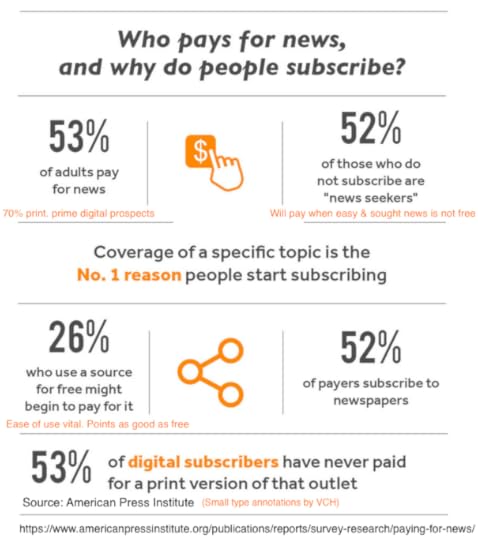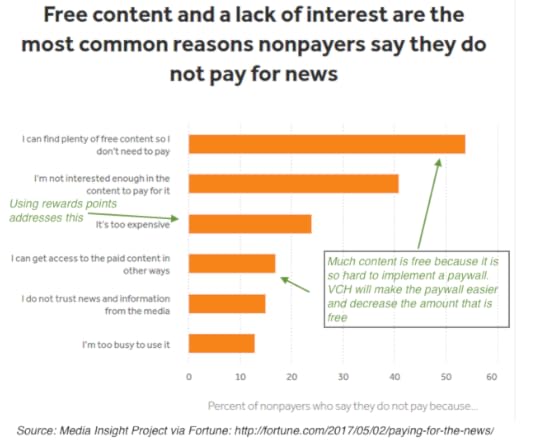Why is news a good first entry into digital content loyalty payments?
Demand. Demand. Demand.
Consumer demand

Click graphic to view a larger image.
See also:
Paying for news: Why people subscribe and what it says about the future of journalism
N.Y. Times Scales Back Free Articles, Gets More Subscribers
Why people pay to read The New York Times
 Also see: Who pays for news
Also see: Who pays for news
 Also see: Who does not pay for news
Also see: Who does not pay for news
Consumer satisfaction: Why VCH loyalty points work better than credit cards for digital content
The difference is perceived value.
Digital content is a bitstream. It is insubstantial, cannot be touched or held. Consumers realized that — while the product has value — the delivery of digital content costs nearly nothing. The product is distantly separated from the original creation costs and efforts.
This insubstantiality and cheap cost of delivery has promoted a culture of “free.” Even before pirated music, movies, and games hit the mainstream, individual software developers pioneered “shareware” and “freeware.” The culture of free has firmly entrenched itself in the digital world, most disastrously in the media.
Loyalty points are similar to digital media in that consumers recognize they have value, but they are like “Monopoly money” — insubstantial and almost “free.” Points can be spent without concern for credit card debt, credit ratings, or commitments.
In short, loyalty points offer a decision process mostly free of serious consideration. This is another reason that casinos use chips instead of cash. Because chips are not cash, that makes a gambling decision easier to make because it hides the reminder that there is a cash consequence.
Credit cards are like casino chips to a lesser extent. However, the required entry of card and personal data, security codes are not only time consuming, but raise the specter of a hack that exposes that to criminals.
Current online credit card payment systems are a hassle for consumers
Current credit card systems require a far greater commitment decision on the part of the consumer. In addition, it requires additional time and effort including the need to find the card if all the data is not memorized.
Other barriers include
Fragmentation = friction. The frequent use of news aggregation operations such as Google mean that a consumer may read articles from a dozen or more sites in one sitting. Similar issues occur for news links visited from social media such as Twitter and Facebook. Many times, site visitors will run up against a paywall — “you have read the last of your free article.”
The need to pull out a credit card for each site often makes visitors click away.
Subscription commitments (usually with default auto-renew) are not feasible for multiple sites the consumer wants to visit.
Purchase per article not available (credit card transaction cost too high).
Current online payment systems are a hassle for media sites
Complicated set-up and maintenance for content payment systems like CCBill or Stripe
Per-article purchase not practical/cost-effective both technically and because of credit card transaction costs and additional fees to billing companies
Index of all documents
Value Clearing House – Summary
First goal: save American journalism
Why is news a good first entry into digital content loyalty payments?
Why would companies who offer loyalty programs like VCH?
Case history: Starbucks
VCH can solve most loyalty program dissatisfaction issues – incentive for corporate participation
How does VCH work?
Solution: Monopoly money for Monopoly digital content — The San Quentin wrapper solution
Proprietary and confidential information of Lewis Perdue. Not to be disclosed to or shared with third parties without written permission.



